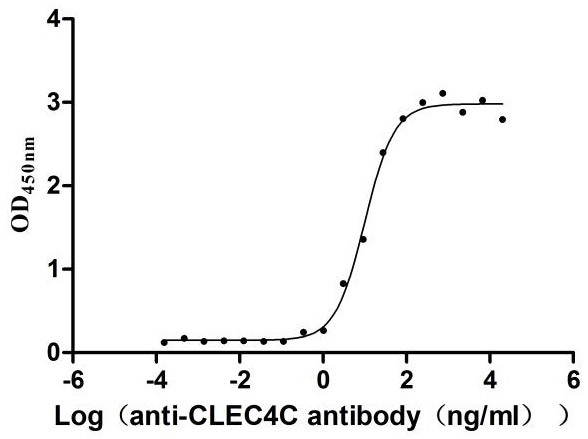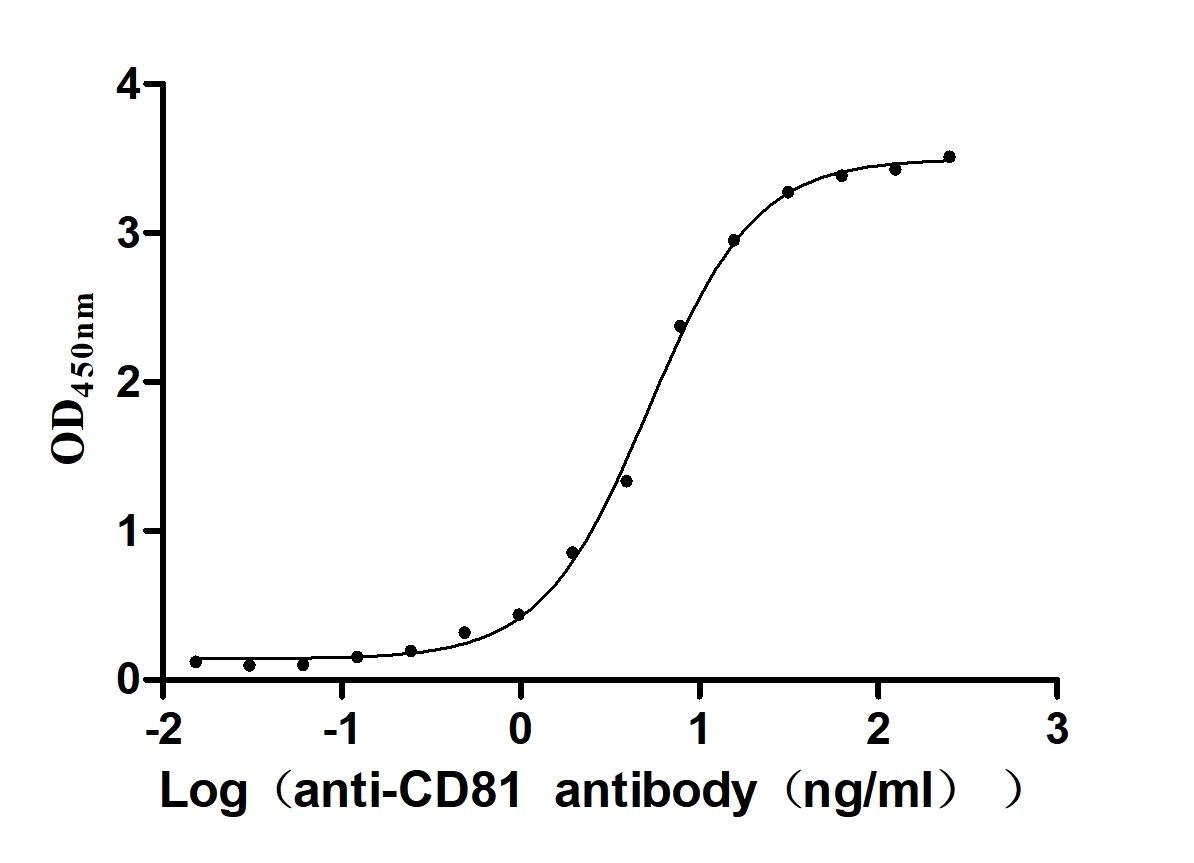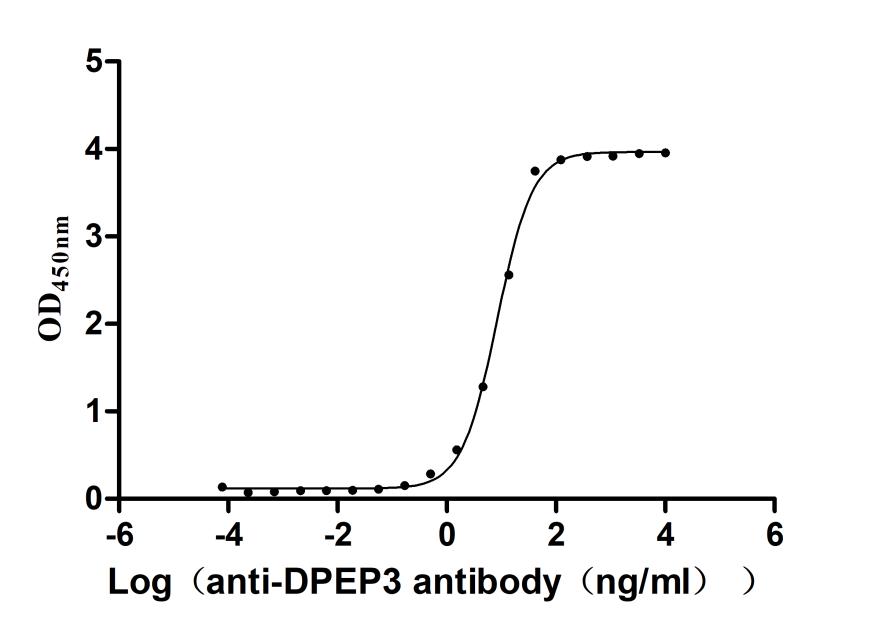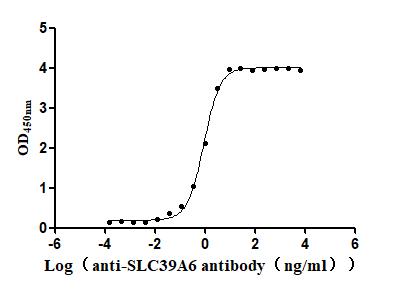Recombinant Human Adapter molecule crk (CRK)
-
中文名称:Recombinant Human Adapter molecule crk(CRK)
-
货号:CSB-YP005979HU
-
规格:
-
来源:Yeast
-
其他:
-
中文名称:Recombinant Human Adapter molecule crk(CRK)
-
货号:CSB-EP005979HU
-
规格:
-
来源:E.coli
-
其他:
-
中文名称:Recombinant Human Adapter molecule crk(CRK)
-
货号:CSB-EP005979HU-B
-
规格:
-
来源:E.coli
-
共轭:Avi-tag Biotinylated
E. coli biotin ligase (BirA) is highly specific in covalently attaching biotin to the 15 amino acid AviTag peptide. This recombinant protein was biotinylated in vivo by AviTag-BirA technology, which method is BriA catalyzes amide linkage between the biotin and the specific lysine of the AviTag.
-
其他:
-
中文名称:Recombinant Human Adapter molecule crk(CRK)
-
货号:CSB-BP005979HU
-
规格:
-
来源:Baculovirus
-
其他:
-
中文名称:Recombinant Human Adapter molecule crk(CRK)
-
货号:CSB-MP005979HU
-
规格:
-
来源:Mammalian cell
-
其他:
产品详情
-
纯度:>85% (SDS-PAGE)
-
基因名:
-
Uniprot No.:
-
别名:Adapter molecule crk; Avian sarcoma virus CT10 (v crk) oncogene homolog; CRK; CRK isoform 2; CRK isoform II; CRK_HUMAN; CRKII; FLJ38130; OTTHUMP00000115366; OTTHUMP00000198330; p38; Proto oncogene C crk; Proto-oncogene C-crk; v crk avian sarcoma virus CT10 oncogene homolog; v crk sarcoma virus CT10 oncogene homolog ; v crk sarcoma virus CT10 oncogene homolog (avian)
-
种属:Homo sapiens (Human)
-
蛋白长度:Full Length of Mature Protein
-
表达区域:2-304
-
氨基酸序列AGNFDSEER SSWYWGRLSR QEAVALLQGQ RHGVFLVRDS STSPGDYVLS VSENSRVSHY IINSSGPRPP VPPSPAQPPP GVSPSRLRIG DQEFDSLPAL LEFYKIHYLD TTTLIEPVSR SRQGSGVILR QEEAEYVRAL FDFNGNDEED LPFKKGDILR IRDKPEEQWW NAEDSEGKRG MIPVPYVEKY RPASASVSAL IGGNQEGSHP QPLGGPEPGP YAQPSVNTPL PNLQNGPIYA RVIQKRVPNA YDKTALALEV GELVKVTKIN VSGQWEGECN GKRGHFPFTH VRLLDQQNPD EDFS
-
蛋白标签:Tag type will be determined during the manufacturing process.
The tag type will be determined during production process. If you have specified tag type, please tell us and we will develop the specified tag preferentially. -
产品提供形式:Lyophilized powder
Note: We will preferentially ship the format that we have in stock, however, if you have any special requirement for the format, please remark your requirement when placing the order, we will prepare according to your demand. -
复溶:We recommend that this vial be briefly centrifuged prior to opening to bring the contents to the bottom. Please reconstitute protein in deionized sterile water to a concentration of 0.1-1.0 mg/mL.We recommend to add 5-50% of glycerol (final concentration) and aliquot for long-term storage at -20℃/-80℃. Our default final concentration of glycerol is 50%. Customers could use it as reference.
-
储存条件:Store at -20°C/-80°C upon receipt, aliquoting is necessary for mutiple use. Avoid repeated freeze-thaw cycles.
-
保质期:The shelf life is related to many factors, storage state, buffer ingredients, storage temperature and the stability of the protein itself.
Generally, the shelf life of liquid form is 6 months at -20°C/-80°C. The shelf life of lyophilized form is 12 months at -20°C/-80°C. -
货期:Delivery time may differ from different purchasing way or location, please kindly consult your local distributors for specific delivery time.Note: All of our proteins are default shipped with normal blue ice packs, if you request to ship with dry ice, please communicate with us in advance and extra fees will be charged.
-
注意事项:Repeated freezing and thawing is not recommended. Store working aliquots at 4°C for up to one week.
-
Datasheet :Please contact us to get it.
相关产品
靶点详情
-
功能:Involved in cell branching and adhesion mediated by BCAR1-CRK-RAPGEF1 signaling and activation of RAP1.; Regulates cell adhesion, spreading and migration. Mediates attachment-induced MAPK8 activation, membrane ruffling and cell motility in a Rac-dependent manner. Involved in phagocytosis of apoptotic cells and cell motility via its interaction with DOCK1 and DOCK4. May regulate the EFNA5-EPHA3 signaling.
-
基因功能参考文献:
- A reduced miR-126 expression and an elevated Crk protein expression, alone or in combination, statistically correlated with aggressive clinicopathological characteristics, such as larger tumor size, deeper local invasion, more lymph node metastasis, advanced TNM stage, and poorer prognosis. PMID: 29171987
- these data highlight a signaling pathway in which SHP-1 acts through CrkII to reshape the pattern of Rap1 activation in the immunological synapse. PMID: 28790195
- Crk-dependent increased phosphorylation of CD3zeta coincided with inhibition of TCR downmodulation, supporting a positive role for Crk adaptor proteins in TCR-mediated signal amplification. PMID: 28465009
- This mini review will focus on the emerging roles of Crk adaptors during myocardial I/R injury. PMID: 28553779
- TGF-beta and Crk collaborate to form a positive feedback loop to facilitate epithelial-mesenchymal transition (EMT). PMID: 27027347
- The results suggest the involvement of Crk adaptor proteins in the early stages of T cell activation in which Crk might help recruiting effector proteins to the vicinity of the phospho-CD3zeta and contribute to the fine-tuning of the TCR/CD3-coupled signal transduction pathways. PMID: 28526413
- Study investigated structures and thermodynamics of the interactions mediated by N-terminal Src homology 3 domain of CrkII and proline-rich motifs (PRMs) of cAbl kinase, highlight the role of interfacial water molecules and the conformational entropy in the SH3:PRM interactions PMID: 27332121
- CrkII mediates IGF-1 signaling and further balances pancreatic ductal adenocarcinoma biological behaviors via Erk1/2 and Akt pathway PMID: 26250463
- In individuals with class I 17p13.3 microduplications including CRK, we recommend biochemical evaluation of the growth hormone axis. Providers caring for these patients should be aware of their possible risk for the development of central precocious puberty. PMID: 27633569
- Crk Tyr251 phosphorylation regulate invasive cell phenotypes in glioblastoma. PMID: 26473374
- CsA and FK506 might interfere with selected effector T cell functions via a CrkII-, but not CrkI-dependent mechanisms. PMID: 26792730
- Studied the role of PAK1/Crk axis in transduction of the oncogenic KRAS signal in non-small cell lung cancer (NSCLC). PMID: 25956913
- in human c-CrkII, movement at position 239 and strain at position 272 are not tolerated because the beta-branched residues Ile239 and Val272 restrain the backbone mobility and thus destabilize the cis Pro238 form. PMID: 26456136
- Data indicate the role of tyrosine phosphorylation in regulating modular domain utilization in v-crk sarcoma virus CT10 oncogene homolog (avian) protein (Crk). PMID: 25381819
- evidence uncovered essential roles of CRK in invasive bladder cancer through the hepatocyte growth factor/c-Met/CRK feedback loop for epithelial-mesenchymal transition induction PMID: 25816892
- In this review, we describe the structure and function of the different Crk proteins. PMID: 25506591
- proline switch and its role in Crk signaling PMID: 24702481
- Data indicate that human proto-oncogene c-CrkII (CrkII) is regulated by phosphorylation only, but chicken CrkII is regulated by Pro238 trans-->cis isomerization and by Tyr222 phosphorylation. PMID: 25284755
- Study indicates that miR-126 is a tumor suppressor that inhibits gastric cancer cells proliferation by targeting PI3KR2, Crk and PLK2. PMID: 24969300
- Crk1/2 and CrkL are physically linked, functionally complement each other during podocyte foot process spreading, and together are required for developing typical foot process architecture. PMID: 24499776
- The present data demonstrate that immunophilins regulate CrkII, but not CrkI activity in T cells and suggest that CsA and FK506 inhibit selected effector T cell functions via a CrkII-dependent mechanism. PMID: 25225668
- This study analyzed the kinetics of folding and substrate binding of the two homologues and found that cis-trans isomerization of Pro238 determines target binding in chicken but not in human CT10 regulator of kinase protein (c-CrkII). PMID: 24571054
- We propose that Crk adaptor proteins inhibit actin polymerization by competing with Nck binding to Tir. PMID: 24675776
- This prospect summarizes recent developments in Crk biology, including new structural and biochemical roles for the atypical carboxyl-terminal SH3 (SH3C) domain. PMID: 24356912
- These findings suggest that PTPN4 negatively regulates cell proliferation and motility through dephosphorylation of CrkI. PMID: 23666597
- P-glycoprotein activity in association with pCrkl reduction levels might help to distinguish between imatinib-resistant and imatinib-sensitive chronic myeloid leukemia cells. PMID: 24210993
- A gene signature derived following CrkII over-expression correlated significantly with basal breast cancers and with high grade and poor outcome in general; data highlight the physiological importance of Crk proteins in regulating growth of aggressive basal breast cancer cells PMID: 22569336
- the role of PAK1 in the promotion of cell motility, cell invasiveness and the down regulation of p120-catenin through CRK serine 41 phosphorylation in NSCLC cells PMID: 22848689
- SRC, c-MET and CRK play a key role in gastric carcinogenesis by modulating CagA signal transductions and interaction between CRK gene and phytoestrogens modify gastric cancer risk PMID: 22383989
- miR-126 may play an initial role in the development and progression of EMs. Crk may be regulated by miR-126, and synergism between abnormal expressions may play an important role in the pathogenesis of EMs. PMID: 22012249
- propose a unified model for inhibitory receptor function: Crk phosphorylation prevents essential Crk-dependent activation signals and blocks F-actin network formation, thereby reducing constraints on subsequent engagement of activation receptors PMID: 22464172
- CrkI and p130(Cas) complex regulates the migration and invasion of prostate cancer cells. PMID: 22144090
- positive regulatory role resulting from tyrosine phosphorylation of Crk, and identify a novel mechanism by which an adaptor protein activates a non-receptor tyrosine kinase by SH2 domain displacement PMID: 21602891
- differential binding selectivity of Crk and CrkL to their downstream partners Dock 180 and C3G was demonstrated in ovarian cancer cell line SKOV3 through coimmunoprecipitation PMID: 21319228
- CRKII increases migration and invasive potential in oral squamous cell carcinoma PMID: 21339045
- SOS1 is essential for CrkI-induced fibroblast transformation, and also reveal a surprising negative role for Abl kinases in Crk transformation. PMID: 20729917
- These results imply that binding capacity of influenza A virus NS1 to CRK/CRKL has evolved in virus strains that over-induce the antiviral acting JNK-ATF2 signalling module and helps to suppress the detrimental apoptosis promoting action of this pathway. PMID: 20088952
- signal transfer of Crk/Dock180/Rac1 is implicated in actin cytoskeleton reorganization and thus in the cell proliferation, motility, invasion, and of human ovarian cancer cell line SKOV3. PMID: 20237902
- Silencing of CRK-I/II increased endothelial cell migration. PMID: 19760510
- Depletion of Crk by RNA interference markedly inhibited proliferation of the synovial sarcoma cell lines HS-SYII, SYO-1, and Fuji as well as prevented anchorage-independent growth. PMID: 19737974
- Molecular and immunohistochemical analysis of signaling adaptor protein Crk in human cancers PMID: 11911970
- determined the NMR solution structure of the ternary complex of the Abl SH3 domain with the Crk SH2 domain bound to a Crk pY221 phosphopeptide PMID: 12384576
- Crk plays a critical role in Rac1-induced membrane ruffling and Rap1-mediated nascent focal complex stabilization contributing to ephrin-B1-induced human aortic endothelial cells migration PMID: 12475948
- Requirement of the p130CAS-Crk coupling for metastasis suppressor KAI1/CD82-mediated inhibition of cell migration in a metastatic prostate cancer cell line. PMID: 12738793
- CRK is ADP ribosylated by Pseudomonas aeruginosa ExoT, demonstrating how ADP-ribosylation of Crk-I may be responsible for the anti-phagocytosis phenotype elicited by ExoT in mammalian cells PMID: 12807879
- c-Src phosphorylates the receptor KIT, thereby creating docking sites for SH2 domain containing proteins, leading to recruitment of Crk to the receptor. PMID: 12878163
- This study provides the first quantitative analysis of discrete CRKI and CRKII protein isoforms in human lung tumors and provides evidence that the C-CRK proto-oncogene may foment a more aggressive phenotype in lung cancers. PMID: 12970743
- Nck and Crk mediate distinct VEGF-induced signaling pathways that serve overlapping functions in cell migration. PMID: 15051508
- a major role for a Crk-cortactin complex in actin polymerization downstream of tyrosine kinase signaling PMID: 15263018
- Crk may be involved in regulation of cell motility by a hyaluronic acid-dependent mechanism through an association with ERMs PMID: 15326184
显示更多
收起更多
-
亚细胞定位:Cytoplasm. Cell membrane.
-
蛋白家族:CRK family
-
数据库链接:
Most popular with customers
-
Recombinant Human Neuropilin-1 (NRP1) (Active)
Express system: Mammalian cell
Species: Homo sapiens (Human)
-
Recombinant Mouse Retinol-binding protein 4 (Rbp4) (Active)
Express system: Mammalian cell
Species: Mus musculus (Mouse)
-
Recombinant Human Microtubule-associated protein tau (MAPT) (Active)
Express system: Mammalian cell
Species: Homo sapiens (Human)
-
Recombinant Human C-type lectin domain family 4 member C (CLEC4C), partial (Active)
Express system: Mammalian cell
Species: Homo sapiens (Human)
-
Recombinant Human CD81 antigen (CD81), partial (Active)
Express system: Mammalian cell
Species: Homo sapiens (Human)
-
Recombinant Macaca fascicularis Dipeptidase 3(DPEP3) (Active)
Express system: Mammalian cell
Species: Macaca fascicularis (Crab-eating macaque) (Cynomolgus monkey)
-
Recombinant Macaca fascicularis Zinc transporter ZIP6 isoform X1(SLC39A6),partial (Active)
Express system: Baculovirus
Species: Macaca fascicularis (Crab-eating macaque) (Cynomolgus monkey)
-
Recombinant Human Urokinase-type plasminogen activator(PLAU) (Active)
Express system: Mammalian cell
Species: Homo sapiens (Human)



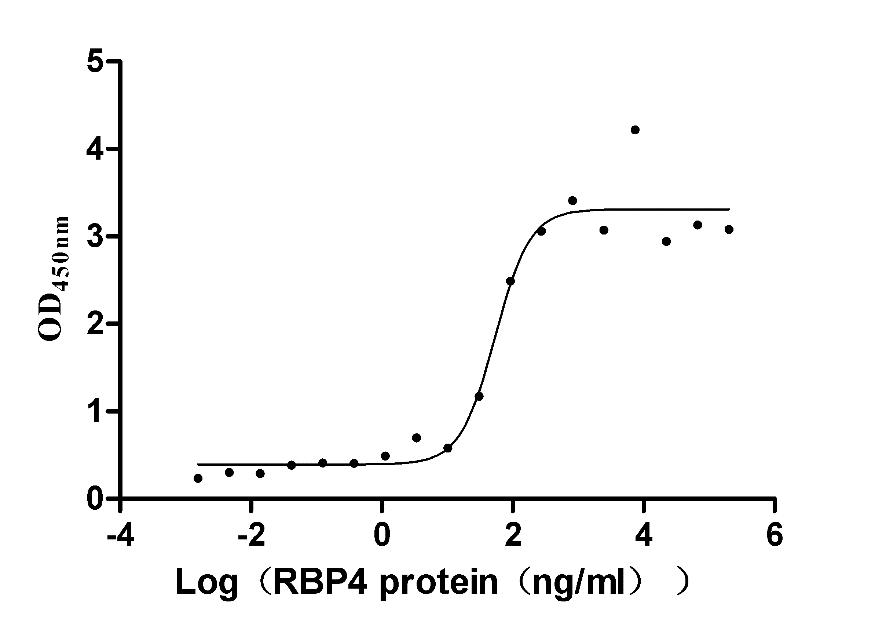
-AC1.jpg)
